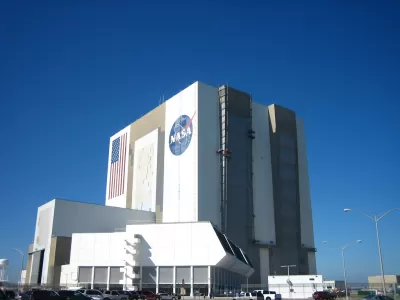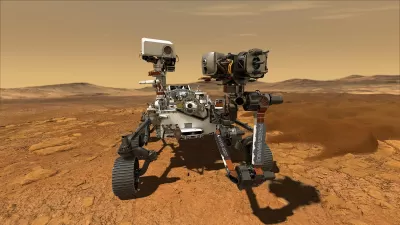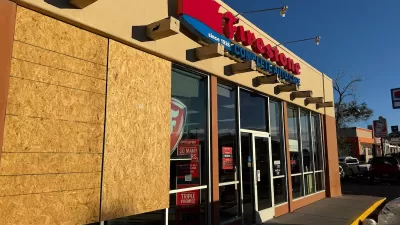Caught between the end of the space shuttle and the potential rise of private sector spaceflight, Cape Canaveral and the Kennedy Space Center present a unique land use challenge.

As the literal launching pad for some of America's most famous achievements, Cape Canaveral now faces an uncertain future. Congress is not about to approve new manned spaceflight programs, and private space companies are still catching up to where NASA was almost 50 years ago. Meanwhile, the Kennedy Space Center lies mostly silent.
Anthony Flint discusses NASA's current multi-dimensional plans for the Florida expanse. While tourism is still a big draw, "NASA clearly wasn't ready to cede this territory completely over to nostalgia. It's all part of a larger political battle, almost willing Cape Canaveral into the future [...] Much of the activity has to do with a fundamental choice that NASA has made: to make facilities available to private sector space initiatives such as Space X."
There's also a green aspect to all of this. "Re-purposing buildings is a common theme here, for both financial and environmental efficiency. NASA dutifully went for LEED platinum rating at the Propellants Maintenance Facility. Over by the area used for testing vehicles on a simulated surface of the moon, solar arrays are being put up, joining a giant solar farm installed in 2008." We'll have to wait and see what's in store for the nation's spaceport.
FULL STORY: The Land-Use Reinvention of Cape Canaveral

Alabama: Trump Terminates Settlements for Black Communities Harmed By Raw Sewage
Trump deemed the landmark civil rights agreement “illegal DEI and environmental justice policy.”

Planetizen Federal Action Tracker
A weekly monitor of how Trump’s orders and actions are impacting planners and planning in America.

The 120 Year Old Tiny Home Villages That Sheltered San Francisco’s Earthquake Refugees
More than a century ago, San Francisco mobilized to house thousands of residents displaced by the 1906 earthquake. Could their strategy offer a model for the present?

In Both Crashes and Crime, Public Transportation is Far Safer than Driving
Contrary to popular assumptions, public transportation has far lower crash and crime rates than automobile travel. For safer communities, improve and encourage transit travel.

Report: Zoning Reforms Should Complement Nashville’s Ambitious Transit Plan
Without reform, restrictive zoning codes will limit the impact of the city’s planned transit expansion and could exclude some of the residents who depend on transit the most.

Judge Orders Release of Frozen IRA, IIJA Funding
The decision is a victory for environmental groups who charged that freezing funds for critical infrastructure and disaster response programs caused “real and irreparable harm” to communities.
Urban Design for Planners 1: Software Tools
This six-course series explores essential urban design concepts using open source software and equips planners with the tools they need to participate fully in the urban design process.
Planning for Universal Design
Learn the tools for implementing Universal Design in planning regulations.
Clanton & Associates, Inc.
Jessamine County Fiscal Court
Institute for Housing and Urban Development Studies (IHS)
City of Grandview
Harvard GSD Executive Education
Toledo-Lucas County Plan Commissions
Salt Lake City
NYU Wagner Graduate School of Public Service





























